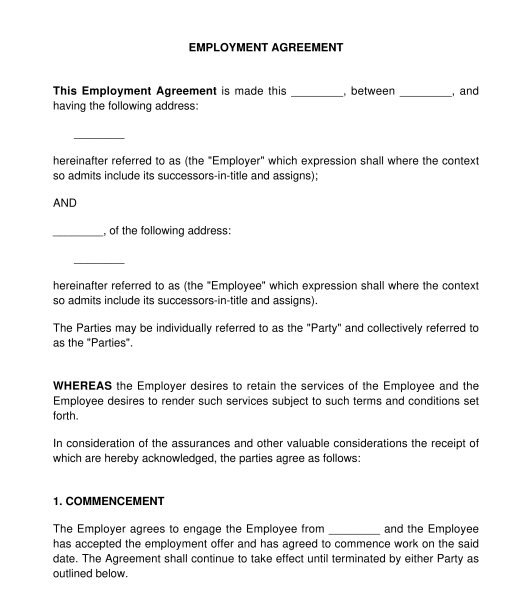 25/10/2025
25/10/2025

Answer a few questions and your document is created automatically.

Your document is ready! You will receive it in Word and PDF formats. You will be able to modify it.

 25/10/2025
25/10/2025
 Word and PDF
Word and PDF
 8 to 12 pages
8 to 12 pages



An employment agreement (also known as an employment contract) is used when an employer wants to retain the employee to provide services in exchange for a fee. An employment agreement outlines the terms and conditions of the employment.
There are several employment agreements. Here are the most common types:
It is important to note that employment contracts can often combine elements of different types of contracts. For instance, an employment agreement might be for a part-time fixed-term position or a full-time permanent position.
The most common type of employment agreement is the full-time permanent employment. In this type of employment, the employee works full-time (35-40 hours per week) in a permanent position. The contract continues until terminated by either of the parties.
In an employment agreement, the employer controls the manner in which the work is done. Employees receive statutory benefits and protections, such as insurance and pension benefits, annual holidays, etc. The employer also handles tax withholdings and social security contributions.
On the other hand, a service agreement establishes a client-contractor relationship where the contractor maintains control over how the work is done. Contractors do not receive employee benefits and are responsible for their taxes.
For more information, see our legal guide "What's the Difference Between an Employee and an Independent Contractor?"
Yes, in Nigeria, an employment contract must be given to the worker within three months of commencement of employment.
A valid employment agreement must contain at least the following mandatory clauses:
The law strictly regulates employment agreements. Hence, among other points, it is not permitted to:
Before having an employment contract, the employee must have signed an employment offer letter. This demonstrates that the employee has accepted to work for the employer.
The employment agreement includes basic terms of the employment, including the job position, job description, compensation and other benefits, and work schedule.
After signing the employment agreement, the employer should send the employment agreement at least within three months from the commencement of employment. However, in practice, many employers send the employment agreement shortly after the employee accepts the employment offer.
The parties to an employment agreement are the employer (who hires a person to work) and the employee (a person who is hired for a job).
An employee can be any individual of 18 years old or older, who has the right to legally reside in Nigeria.
Under the law, a child and young persons under the age of 15 may work but there are strict rules regulating the employment of a minor. Generally, a child cannot work except when they are employed to do light work. Additionally, young persons below the 15 will require parental consent to work.
An employer should be a national or international organization based and officially registered as a legal entity in Nigeria.
An employment agreement cannot be used in a situation when an employee is less than 18 years old.
In cases where a minor is hired, the employer must comply with the rules and obtain the consent of their parent or guardian.
The duration of employment is a crucial aspect of an employment agreement, and it is mutually decided by the employer and the employee based on their needs and preferences. The duration can be categorized into two main types: indefinite period and fixed term.
When an employment agreement is indefinite, it means that the employment relationship continues until either the employer or the employee decides to end it. On the other hand, employment is for a fixed term if it is set for a specific duration, with a clear start and end date.
The employment agreement should be signed by both parties in two original copies. The employment agreement can be signed in person or electronically. After signing, each party should keep one signed copy for their record.
In some cases, the following documents may be attached to the employment agreement:
To proceed with further employment, an employee would need to provide an employer with the following list of additional documents:
No, employment agreements are not registered with any authority or agency in Nigeria.
Yes, the employment agreement needs to be witnessed to be valid.
After the parties have signed, the document must be witnessed by at least one person. The witness is required to hand fill in their names, addresses, and occupations and also sign the document.
No costs are associated with the finalization of an employment agreement.
Every employer is responsible for the payment of the wages of their employees, as well as the corresponding social security and income tax. There are different types of wages including hourly, monthly, and annual payments. However, the most common form of payment is monthly compensation. Employees typically receive monthly salaries at the end of the month by bank transfer.
Employment and employment agreements are subject to Federal laws as issues relating to employment and labour matters in Nigeria are within the exclusive purview of the federal legislature. The Federal laws applicable to this agreement include:
You fill out a form. The document is created before your eyes as you respond to the questions.
At the end, you receive it in Word and PDF formats. You can modify it and reuse it.
Guides to help you
Employment Agreement - FREE - sample template
Country: Nigeria